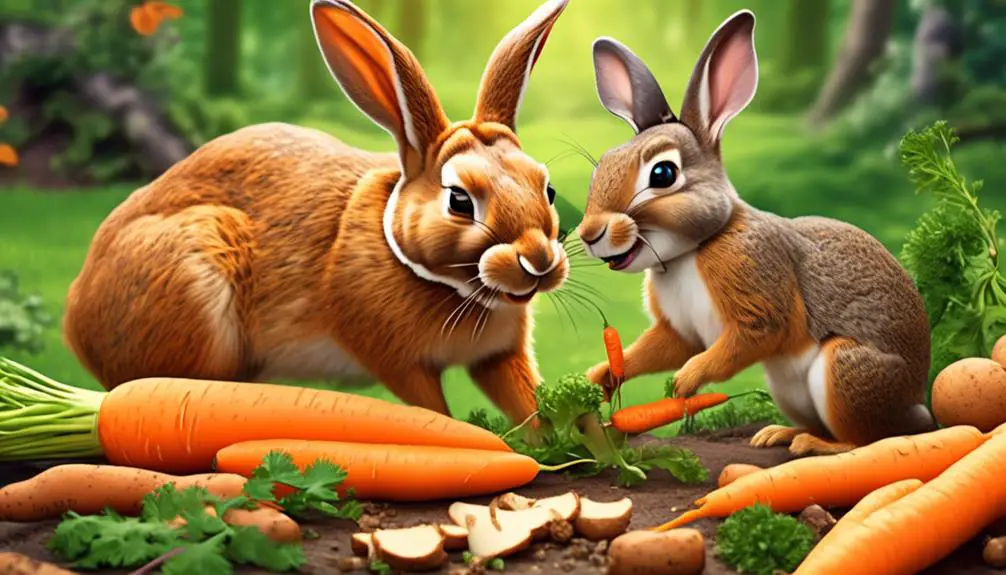Do you ever wonder what animals have a taste for carrots, like ants at a picnic? Well, get ready to explore the fascinating world of carrot-loving creatures.
From the adorable rabbits who gobble up every part of the carrot, to the groundhogs with their diverse diet, and the nimble squirrels that can’t resist a crunchy orange treat, there is a surprising variety of animals that enjoy indulging in this vibrant vegetable.
But that’s not all! There are even more unexpected creatures that savor the irresistible allure of the carrot.
So, if you’re curious to find out which animals have a penchant for carrots, stick around and prepare to be amazed.
Rabbits and Their Carrot-Rich Diet
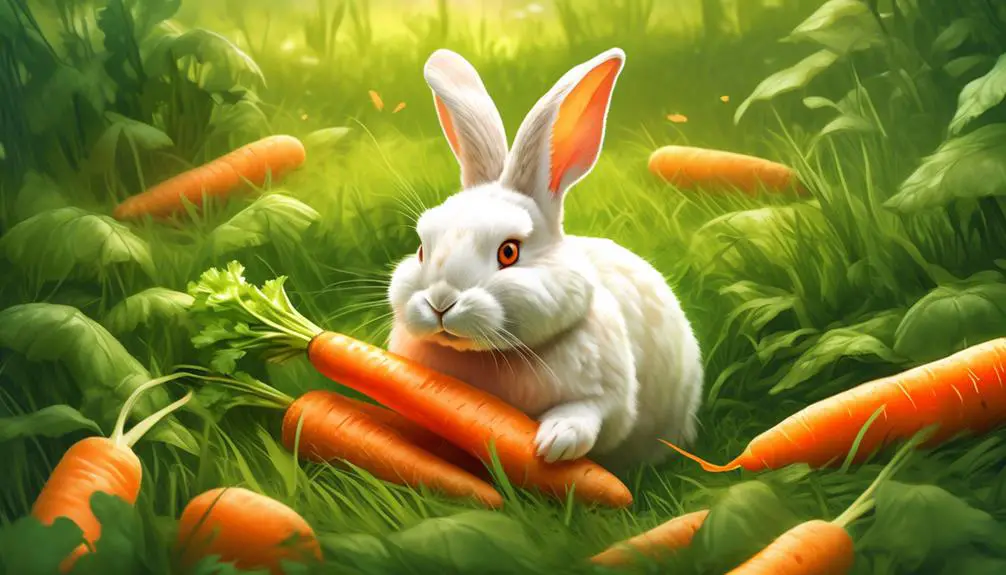
Rabbits have a diet rich in carrots, which are a favorite vegetable among these small herbivorous mammals. Along with carrots, rabbits consume vegetable greens like turnip tops, radish tops, and carrot tops. Wild rabbits feed on clovers, dandelions, and various vegetables including carrots. An average rabbit weighing 5-6 pounds consumes about 1/4 cup of vegetable greens daily. Rabbits can squeeze through small openings and often seek shelter near their food source.
Carrots provide rabbits with essential nutrients, such as vitamin A, which is crucial for their vision and overall health. The high fiber content in carrots helps maintain their digestive system and prevents gastrointestinal issues. Additionally, carrots are a good source of potassium and antioxidants, which support the rabbit’s immune system.
When feeding rabbits carrots, it’s important to remember moderation. While carrots are a nutritious addition to their diet, excessive consumption can lead to weight gain and digestive problems. It’s recommended to provide a balanced diet that includes a variety of vegetables and hay to ensure optimal health for rabbits.
Groundhogs’ Love for Carrots
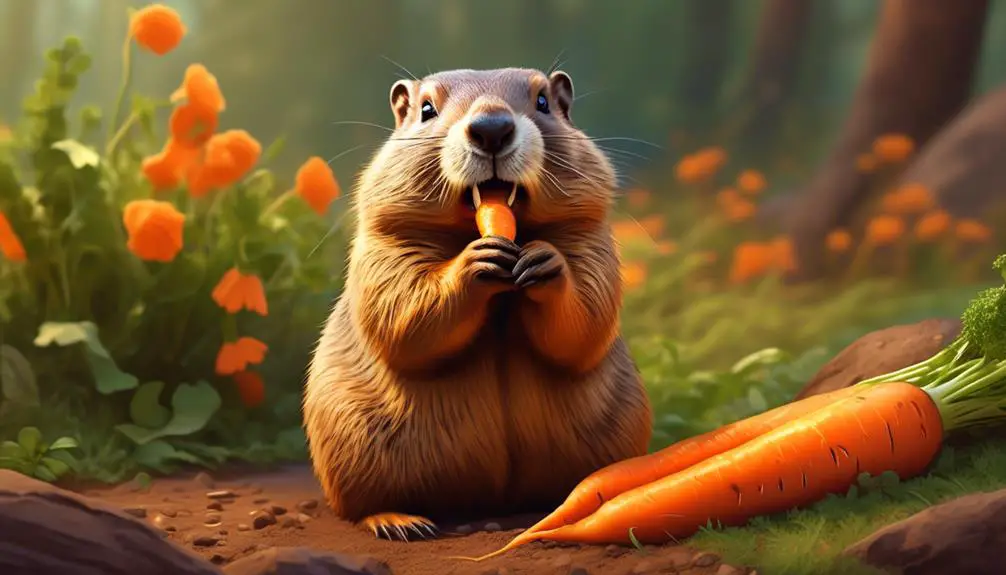
Groundhogs, like their rabbit counterparts, also have a fondness for carrots as part of their diverse diet. Groundhogs, also known as woodchucks, are herbivorous creatures that enjoy feasting on various garden vegetables, fruits, and insects. They can cause damage to plant seedlings and are known for their ability to burrow underground.
The diet of groundhogs includes beans, peas, alfalfa, broccoli, lettuce, soybeans, and plantain. However, during the mid-spring when carrots grow abundantly, groundhogs indulge in this delicious root vegetable. Both adult groundhogs and their offspring are plant eaters, and carrots become a significant part of their food source during this time.
Groundhogs’ love for carrots isn’t only a result of their taste preference but also because carrots provide essential nutrients and energy. These rodents benefit from the vitamins and minerals present in carrots, making them a valuable addition to their diet.
Squirrels and Their Vegetable Preferences
Do you ever wonder what vegetables squirrels prefer to eat?
Well, squirrels are omnivorous mammals that have a varied diet. They do enjoy eating carrots along with other vegetables and fruits like broccoli, grapes, strawberries, pumpkin, and apples. While they may prefer acorns and walnuts, carrots provide health benefits for squirrels and are considered low-calorie treats.
Squirrel’s Vegetable Favorites
Squirrels have a diverse range of vegetable favorites that they enjoy, including but not limited to carrots, broccoli, grapes, strawberries, pumpkin, and apples. These omnivorous mammals have a varied diet that consists of young snakes, twigs, tree barks, and a variety of vegetables and fruits. They can be found living in trees or on the forest floor.
While squirrels may prefer acorns and walnuts, carrots are also safe for them to eat and provide health benefits. Carrots are considered low-calorie treats for squirrels. Their vegetable preferences allow them to obtain necessary nutrients and energy.
Carrots Vs. Acorns
When comparing the vegetable preferences of squirrels, one interesting comparison to make is between carrots and acorns.
Squirrels are omnivorous mammals that consume a variety of foods, including young snakes, twigs, tree barks, and vegetables.
While squirrels will eat carrots, they may have a preference for acorns and walnuts.
Carrots provide health benefits for squirrels and are considered low-calorie treats.
Acorns, on the other hand, are rich in fats and proteins, which are important for the squirrels’ energy needs.
Squirrels have a natural instinct to collect and store acorns for the winter months when food is scarce.
Deer’s Surprising Taste for Carrots
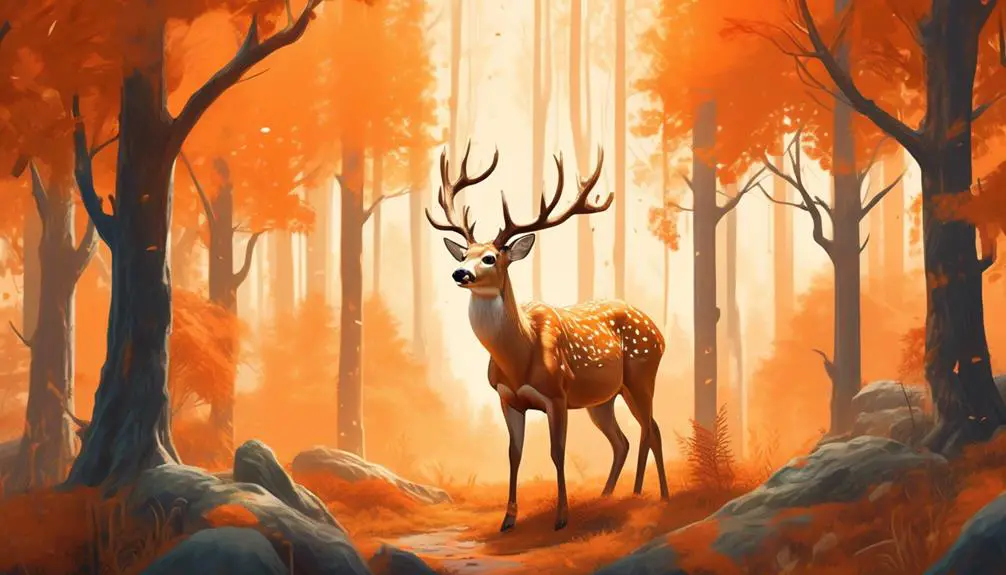
Deer, known for their grazing habits, have developed a surprising taste for the orange root vegetable. While deer are primarily herbivores, their diet mainly consists of leaves, twigs, fruits, and grasses. However, carrots have become a favored food source for these graceful creatures. The sweet and crunchy texture of carrots seems to appeal to their palates.
Deer are attracted to carrots for several reasons. Firstly, carrots are rich in nutrients such as vitamin A, vitamin K, and potassium, which are essential for their overall health and well-being. Secondly, carrots provide a good source of hydration due to their high water content. This is particularly important for deer during dry seasons when water sources may be scarce. Additionally, carrots are easily accessible and require minimal effort to consume, making them an ideal food choice for deer.
Interestingly, the association between deer and carrots has led to some unusual encounters. Gardeners and farmers often find deer invading their vegetable patches, specifically targeting the carrot plants. The deer’s surprising taste for carrots has led to the need for protective measures to prevent damage to crops.
Horses and Their Affinity for Carrots
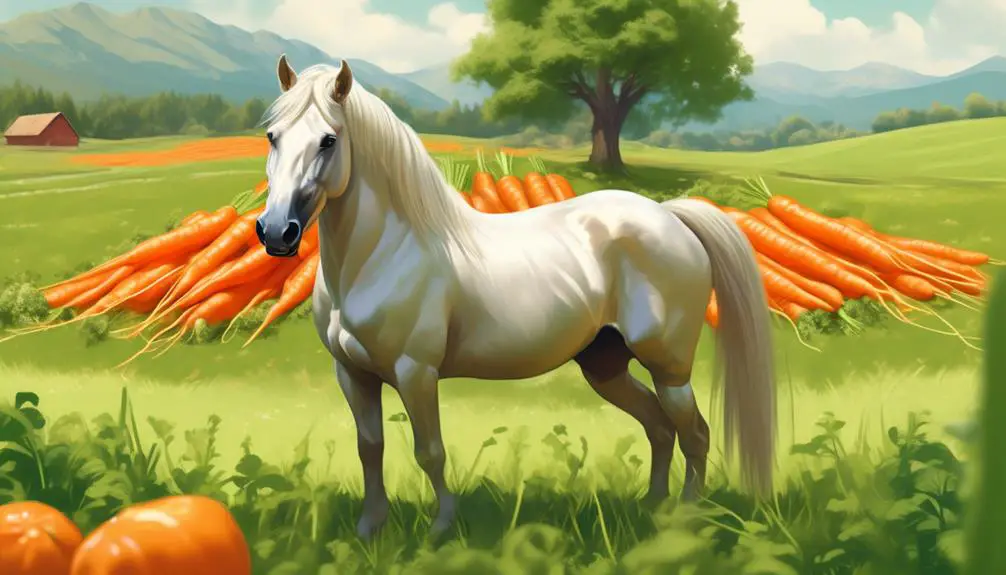
Did you know that horses have a natural affinity for carrots? Carrots are a popular treat among horses due to their sweet and crunchy texture. Horses are herbivores and primarily eat grass and hay, but they also enjoy consuming a variety of fruits and vegetables, including carrots.
Carrots provide numerous health benefits for horses. They’re rich in vitamins and minerals such as vitamin A, which promotes healthy vision and skin, and potassium, which is essential for proper muscle function. Additionally, carrots contain fiber, which aids in digestion and helps prevent colic, a common digestive disorder in horses.
Feeding carrots to horses should be done in moderation. While horses enjoy the taste of carrots, excessive consumption can lead to weight gain and dental issues. It’s important to cut carrots into small, bite-sized pieces to prevent choking and to monitor the amount given to avoid overfeeding.
Ants’ Tiny but Mighty Appetite for Carrots
Ants may be tiny, but their appetite for carrots is mighty. These industrious insects are known to feast on carrots, along with other vegetable crops. Their ability to infiltrate gardens and fields can have a significant impact on carrot crops, making it important for farmers and gardeners to take measures to protect their harvest.
Ants and Carrot Consumption
Ants, with their insatiable appetite for carrots, play a surprising role in the consumption of this vibrant vegetable. While not commonly associated with carrot consumption, ants are actually one of the many insects that enjoy feasting on these root vegetables. Alongside ants, other insects such as the Vegetable Weevil, Nematodes, and Wireworms also have a taste for carrots.
This diverse group of creatures showcases the wide range of organisms that can be attracted to and benefit from the nutritional value of carrots. It’s important to recognize that while ants may not be the first creatures that come to mind when thinking about carrot consumption, they too contribute to the complex and interconnected web of food chains and ecosystems in which carrots play a crucial role.
Impact on Carrot Crops
The impact of ants’ tiny but mighty appetite for carrots on carrot crops is a significant concern for gardeners and farmers. Ants are attracted to the sweet scent of carrots and can quickly infest a crop, causing damage to both the foliage and the roots. They can tunnel into the carrot roots, creating entry points for pathogens and leading to rot. This can result in stunted growth, misshapen carrots, and a decrease in overall crop yield.
Additionally, ants can attract other pests, such as aphids, which can further damage the carrot plants. To mitigate the impact of ants on carrot crops, farmers and gardeners can employ various control methods. These include using insecticidal sprays, implementing cultural practices to reduce ant populations, and utilizing physical barriers to prevent ant access to the carrot plants.
Vegetable Weevil and Its Carrot Feast
The Vegetable Weevil, known for its destructive feeding habits, considers carrots to be a delectable feast. This tiny insect, scientifically known as Listronotus oregonensis, can cause significant damage to carrot crops. The table below provides an overview of the Vegetable Weevil and its impact on carrots:
| Vegetable Weevil | Impact on Carrots | Damage |
|---|---|---|
| Appearance | Small, brown | Feeding on carrot roots and foliage |
| Life Cycle | Egg, larva, pupa, adult | Larvae feed on carrot roots, while adults consume foliage |
| Feeding Habits | Chewing mouthparts | Creates holes in leaves, skeletonizes foliage, and causes root damage |
| Damage | Stunted growth, wilting, yellowing leaves | Can lead to reduced yield and poor quality carrots |
| Prevention | Crop rotation, insecticides | Regular monitoring and early detection of infestations |
| Control | Biological control agents, such as parasitic wasps | Integrated pest management strategies |
Understanding the feeding habits and impact of the Vegetable Weevil is crucial for carrot growers. By implementing preventive measures and effective control strategies, farmers can mitigate the damage caused by these destructive pests and ensure a healthy carrot harvest.
Nematodes and Their Impact on Carrot Crops
Nematodes pose a significant threat to carrot crops due to their detrimental impact on root health and overall plant productivity. These microscopic roundworms can cause severe damage to the roots of carrot plants, leading to stunted growth, reduced yield, and even plant death. Nematodes feed on the root tissues, causing lesions and impairing the plant’s ability to absorb water and nutrients. This results in poor root development and weakened plants that are more susceptible to diseases and environmental stressors.
There are several species of nematodes that can affect carrot crops, including the root-knot nematode (Meloidogyne spp.) and the lesion nematode (Pratylenchus spp.). These nematodes can persist in the soil for long periods, surviving on organic matter and infecting new carrot plants each season. They can be introduced into carrot fields through infected soil, contaminated equipment, or by other means of transportation.
To manage nematode infestations, farmers employ various strategies. Crop rotation with non-host plants, such as cereals or legumes, can help reduce nematode populations by depriving them of their preferred food source. Additionally, soil solarization, the process of heating the soil using transparent plastic sheets, can be effective in killing nematodes and their eggs.
Wireworms and Their Underground Carrot Diet
Wireworms, the larvae of click beetles, are destructive pests that feed on the underground parts of carrot plants. Their diet consists primarily of the roots and tubers, causing significant damage to carrot crops.
This feeding behavior can result in stunted growth, reduced yield, and even plant death, making wireworms a major concern for carrot farmers.
Wireworms’ Destructive Feeding
Wireworms, tiny underground pests, have a voracious appetite for carrots and other root vegetables. These pests belong to the click beetle family and are the larvae of various species. Wireworms are known for their destructive feeding habits, which can cause significant damage to crops. They feed on the underground parts of plants, including the roots, stems, and tubers.
When wireworms attack carrots, they create tunnels and burrows in the soil, making it difficult for the plants to absorb water and nutrients. This can lead to stunted growth, wilting, and even death of the carrot plants.
Farmers and gardeners often employ preventive measures, such as crop rotation and using insecticides, to control wireworm infestations and protect their carrot crops.
Impact on Carrot Crops
The destructive feeding habits of wireworms can have a significant impact on carrot crops. These underground pests tunnel and burrow in the soil, hindering the absorption of water and nutrients by the plants.
Wireworms, the larvae of click beetles, feed on the roots of carrot plants. This causes stunted growth and reduced crop yield. They create tunnels in the soil, making it difficult for the carrots to establish a strong root system and access the necessary resources for healthy growth.
The wireworms also leave behind excrement and saliva, further contaminating the soil and potentially spreading diseases.
To mitigate the impact of wireworms on carrot crops, farmers may employ cultural practices such as crop rotation, deep plowing, and the use of insecticides specifically targeted towards wireworms.
Health Benefits of Carrots for Animals
Carrots provide numerous health benefits for a variety of animals, contributing to their overall well-being and nutrition. Carrots are packed with essential nutrients such as vitamin A, vitamin K, potassium, and dietary fiber, which promote good health in animals. Vitamin A is crucial for maintaining healthy vision, skin, and immune function. Animals that consume carrots regularly may experience improved eye health and a strengthened immune system.
Carrots also contain antioxidants such as beta-carotene, which can help protect animals from oxidative stress and reduce the risk of chronic diseases. Additionally, the high fiber content in carrots supports proper digestion and can prevent constipation in animals.
For herbivorous animals like rabbits, carrots are a healthy addition to their diet. They provide necessary vitamins and minerals while satisfying their natural chewing instincts. Carrots can also be beneficial for groundhogs and squirrels, providing them with essential nutrients and a tasty treat.
It is important to note that while carrots offer health benefits, they should be given in moderation to prevent excessive sugar intake, which can lead to weight gain and other health issues in animals. It’s always best to consult with a veterinarian to determine the appropriate amount of carrots for your specific animal companion.

Erzsebet Frey (Eli Frey) is an ecologist and online entrepreneur with a Master of Science in Ecology from the University of Belgrade. Originally from Serbia, she has lived in Sri Lanka since 2017. Eli has worked internationally in countries like Oman, Brazil, Germany, and Sri Lanka. In 2018, she expanded into SEO and blogging, completing courses from UC Davis and Edinburgh. Eli has founded multiple websites focused on biology, ecology, environmental science, sustainable and simple living, and outdoor activities. She enjoys creating nature and simple living videos on YouTube and participates in speleology, diving, and hiking.

